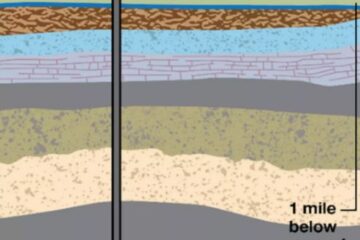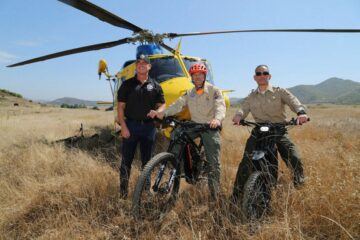Support Grows for Bill to Protect Lost Coast
Natural forces have limited man’s intrusion in the rugged landscape. Now a federal bill aims to keep it untrammeled.
Source of this article – Los Angeles Times, February 20, 2005.
By JULIE CART, Times Staff Writer
BLACK SANDS BEACH, Calif. — Pounding waves scour these jutting headlands, dredging rock and sand into the surf. The rain-soaked hillsides periodically shrug, sending tons of land into the path of the waves. The sea reciprocates by regurgitating sand up on the ever-shifting beach.

SOLITUDE: The Lost Coast, where rugged mountains rise from deserted beaches, is the centerpiece of an ambitions bill to bestow the nation’s highest protections on 300,000 acres of federal wilderness. Road-building, motorized recreation, logging, mining and other commercial development would be prohibited if it passes.
Nature’s primitive architecture defines this 26-mile run of spectacular coast, the longest stretch of undeveloped coastline in the continental U.S. Its compelling landscape is the centerpiece of an ambitious wilderness bill that would bestow the nation’s highest protections on an area known as the Lost Coast in Humboldt County.
Like the coast itself, supporters of the Northern California Coastal Wild Heritage Wilderness Act say, this bill is special. The more than 300,000 acres of federal land have been hand-selected for their beauty, suitability and broad base of support, including that of local ranchers, hunters and California’s largest homebuilder.
“If the bill passes, we are telling the public: ‘This is special enough to protect in perpetuity.’ I think it is,” said Gary Pritchard-Peterson, who manages the federal conservation area included in the proposed legislation.
The bill, recently introduced by members of the California congressional delegation, has attracted bipartisan support at a time when wilderness protection is finding few political allies. President Bush has set aside fewer acres of wilderness than any previous president.
Last week, Gov. Arnold Schwarzenegger threw his support behind the legislation. Sen. Larry E. Craig (R-Idaho), an opponent of past wilderness bills, praised the effort to draw in diverse voices.
Rep. Mike Thompson (D-St. Helena) introduced the bill in the House, and California’s Democratic Sens. Barbara Boxer and Dianne Feinstein are the co-sponsors of the Senate version.
The Lost Coast is part of the 40,000 acres within the King Range National Conservation Area earmarked for wilderness designation. The area is operated by the federal Bureau of Land Management.
Wilderness designation is often controversial because the classification prohibits some activities, such as road-building, motorized recreation, logging, mining and other commercial development. The permanent restrictions are in keeping with the Wilderness Act, which defines wilderness as areas where tthe earth and its community of flfe are untrammeled by man.”

MADE FOR WALKING: With few roads, the Lost Coast is a paradise for hikers. Mountain bikers worry that the bill would put miles of trails off-limits.
For years, diverse groups have pored over drafts of legislation for the Lost Coast and demanded a range of changes. Borders were moved hundreds of yards to accommodate nrefighting concerns. Some acreage was removed, and buffer zones were added. To ensure access for private property owners, no existing roads were closed. Livestock grazing was permitted. Hunting, fishing and other recreational uses were preserved.
“We’ve had Senate hearings. We’ve had town hall meetings in the district. Everyone had their say,” Thompson said. “We have addressed all of the legitimate issues.”
But there are detractors. Some landowners, off-road enthusiasts and even the International Mountain Bicycling Assn. oppose wilderness designation.
Leiand W. Hadley’s family has ranched the King Range since 1856, and he still owns property within the conservation area. His opposition to the bill centers on the prohibition against new roads. At 86, “You don’t walk very far,” he said, adding that it is eight to 10 miles from the edge of his property to the nearest road.
“Getting across the mountains is too tough, so I’d have to walk the beach, and that’s not easy,” he said.
Mary Etter, whose family has been ranching in Honeydew and within the King Range since the turn of the century, said she was opposed to the wilderness restrictions against motorized access. Etter is among a handful of “inholders,” those who own private property within larger federal parcels. The bill doesn’t affect their property rights and specifically allows existing roads to remain.
Nevertheless, Etter is not mollified. “You don’t know what the future is going to bring, and I’m concerned about not being able to use my land,” she said.
 Mountain bikers say 170 miles of trails currently open to them would be placed off-limits under the terms of the bill. Under some federal land management policies, mountain bikes are classified as off-highway vehicles and prohibited from wilderness areas.
Mountain bikers say 170 miles of trails currently open to them would be placed off-limits under the terms of the bill. Under some federal land management policies, mountain bikes are classified as off-highway vehicles and prohibited from wilderness areas.
Jenn Dice, government affairs director for the Colorado-based International Mountain Bicycling Assn., said the organization supports wilderness protection.
“We can’t lose those trails,” Dice said. “We haven’t seen any compromises made for mountain bikes.”
She hopes there will be negotiating room during House debate.
The legislation’s next stop is the House Resources Committee, chaired by Rep. Richard W. Pombo (R-Tracy). Pombo generally opposes restrictions on the use of federal land.
Even though a nearly identical version was introduced last year and was unanimously passed by the Senate, it stalled in the House. At that time, Pombo said it was too broad and failed to take into consideration such issues as access, private property and wilderness fire management.
This time, Pombo has promised to hold hearings and, a spokesman said, “If there has been public input, bipartisan support and consensus, the bill will have a reasonable chance of getting Chairman Pombo’s approval.”
Thousands of miles from the political debate, Pritchard-Peterson surveys a broad, tar-colored beach. Even on a rare sunny day, the sand bears no footprints. The King Range’s lonely vistas of barbed mountains rising from deserted beaches belie its history of bustling commerce and recreation.
Ships once laid off the coast, awaiting cut timber that came rolling down hillsides to the south. Workers shipped bark from local oaks for processing and use in tanneries. Fishing boats put out from a busy pier that once stood in nearby Shelter Cove, where sheep ranchers made their home.
In more recent times, weekend revelers roared around the beach aboard dune buggies, an activity that was banned in 1998. Scores of the vehicles that became mired in the sand now lay buried beneath Black Sands Beach, reclaimed by nature and the coast’s relentless pounding surf.
This stretch of coast and the range of near-vertical mountains are earmarked for wilderness protection. The more accessible and developed portions of the conservation area over the mountains would remain open to various recreational pursuits, including off-highway vehicles and mountain bikes.
Also included in the bill are other areas managed by the BLM and the U.S. Forest Service in Humboldt, Mendocino, Napa, Del Norte and Lake counties. In addition, the bill would designate Black Butte River in the Mendocino National Forest a wild and scenic river, which would protect endangered chinook salmon and winter-run steelhead trout by preventing it from being dammed.
Outside the borders of the proposed protected area, the values of adjacent property are likely to rise with wilderness status. Even with the coast’s natural attractions, tl*ere are few settlements in the region, with nature conspiring to allow only narrow, curving roads clinging to fearsome hillsides. Each town exists in isolation, with fog, rain, lack of level ground and white-knuckle roads inhospitable to development.
Not even the famous Highway 1 could penetrate the mountains; it swerves inland around them, thus creating the Lost Coast.
Still, federally designated wilderness is expected to lure more tourists to these remote areas;
already the BLM cites economic impact studies from 2000 that indicate the King Range generates more than $7 million in annual spending.
The area is popular with hikers along the Pacific Coast Trail and Boy Scouts seeking their merit badges for 50-mile hikes, among others.
For Peter Windrem, an attorney in Kelseyville who hunts, horse packs and farms in the region, not every public place needs to provide an adjacent parking space.
“In my lifetime, there will be countless places I can’t get to,” he said. “That doesn’t mean I value them any less or that I would not want that experience to be available to others.”



1 Comment
Wilderness Bill Is a Dead End for Bicyclists – VenturaCountyTrails.org News · July 25, 2022 at 5:09 pm
[…] letter is a response to this article in the LA […]
Comments are closed.